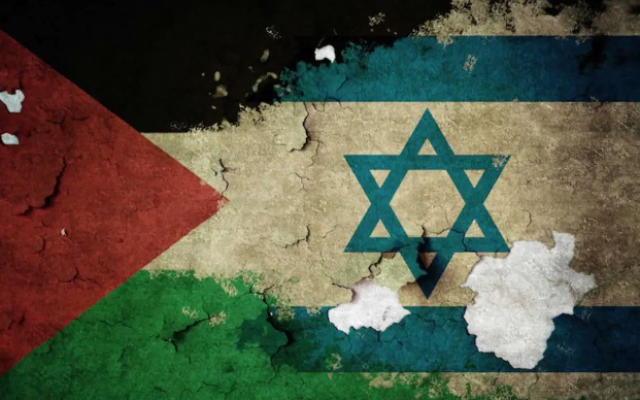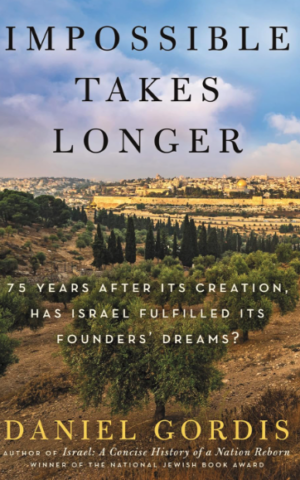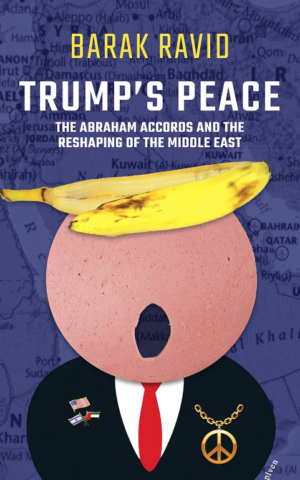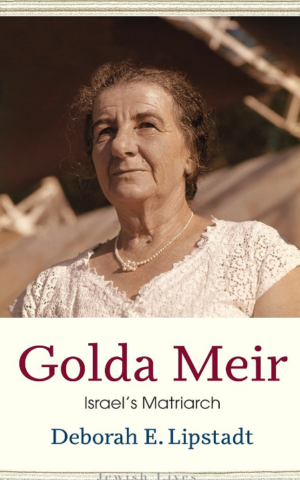Israel Books to Understand the Middle East Today
A selection of a half-dozen titles, mostly by authors from Israel, that have appeared in the past year.

The tragic events of the Hamas attacks in Israel only heighten the sense that 2023 is becoming an extraordinary year in the history of the Jewish state. One has to look hard and long to find a year in Israel’s past that offered so many challenges, almost simultaneously.
For those searching for some guidance out of their individual bewilderment, part of the solution may be as close as the shelves of your nearest bookseller or the checkout window of your preferred online bookstore.
Only time will tell whether all of these choices will be dated by the rapidly developing crises that Israel now faces. Here, however, is a sampling of a half-dozen of the most promising titles that have mostly appeared about Israel during this tumultuous year.

Impossible Takes Longer – 75 Years After its Creation, Has Israel Fulfilled its Founders’ Dreams? — Daniel Gordis
This distinguished American-born Israeli writer attempts to measure Israel’s successes and its shortcomings using the words the founding fathers wrote in the country’s Declaration of Independence. Using the document as his guide, Gordis, a National Jewish Book award winner who has made several appearances in Atlanta, takes on a wide range of issues. They are all framed by his well-informed understanding of contemporary life in Israel and his optimistic assessment of the future. It’s a welcome companion to Gordis’ “Israel: A Concise History of a Nation,” published to critical acclaim in 2017.
Target Tehran: How Israel Is Using Sabotage, Cyberwarfare, Assassination – and Secret Diplomacy – to Stop a Nuclear Iran and Create a New Middle East — Yonah Jeremy Bob Ilan Evyatar
An account of the extraordinary success that Israel’s Mossad has accomplished in its secret war against Iran’s nuclear weapons program. If, indeed, Iran has played an important role in the success of Hamas in its invasion of southern Israel, then the role of the Mossad in its war against Iran can only be expected to increase.

Trump’s Peace: The Abrahamic Accords and the Reshaping of the Middle East — Barak Ravid
A bestseller when it first appeared in Hebrew at the end of 2021 and now available this year in an English translation, Ravid who is a busy journalist and frequent TV news, interview purports to give a behind-the-scenes look at the events leading up to the Abraham Accords. They initially promised so much in the quest for a more peaceful and productive relationship with the Arab world.
The author had two interviews with the former president, along with several dozen well-placed sources in Europe, America, and the Middle East in an effort to assess how the Accords came about. There’s no doubt he’s scrambling these days to make sense of what happens next in the cooling romance between Israel and some of its neighbors.
Eighteen Days In October – The Yom Kippur War and How It Created the Modern Middle East — Uri Kaufman
This summer’s feature film about Golda Meir and the crisis she faced during the Yom Kippur War could make an interesting companion piece to this history of the 1973 conflict. Kaufman argues in this comprehensive account of the war, that far from being a demoralizing military campaign, the conflict was a turning point in Israel’s relationship with the Arab world. Because it demonstrated that Israel could not be destroyed by military means alone, the war helped lay the groundwork for the agreements between Israel and Egypt during the Carter Administration and other successes that reshaped the region for years to come.

The Only Woman In The Room: Golda Meir and her Path To Power — Pnina Lehav
Golda Meir: Israel’s Matriarch — Deborah Lipstadt
A reconsideration of Golda Meir’s career as a woman in the largely man’s world of Israeli politics in the 20th century. Lehav, a retired, Israeli-born professor of Jewish studies at Boston University, argues that Meir, while not calling herself a feminist, helped to refine the role of women in the political life of Israel, when she became its first and only woman prime minister. Her accomplishment didn’t end there, however, as she was a savvy decision maker, an accomplished diplomat and political leader whom the author believes doesn’t deserve the lack of respect she received after she retired from politics in 1974.
Lipstadt, the noted Jewish historian who took a leave of absence from Emory University to serve in the Biden administration, has given us a quick, but balanced, read about the Israeli leader in the Yale University Press’ series of Jewish Lives. Meir is neither is a devil nor an angel in Lipstadt’s balanced estimation, but she believes she doesn’t always get a fair shake because she was a woman, and a tough one at that.
- Arts and Culture
- Israel
- Bob Bahr
- hamas
- Impossible Takes Longer - 75 Years After its Creation
- Has Israel Fulfilled its Founders’ Dreams?
- Daniel Gordis
- National Jewish Book Award
- Trump’s Peace: The Abrahamic Accords and the Reshaping of the Middle East
- Barak Ravid
- Target Tehran: How Israel Is Using Sabotage
- Cyberwarfare
- Assassination – and Secret Diplomacy – to Stop a Nuclear Iran and Create a New Middle East
- Yonah Jeremy Bob Ilan Evyatar
- Eighteen Days In October - The Yom Kippur War and How It Created the Modern Middle East -
- Uri Kaufman
- The Only Woman In The Room: Golda Meir and her Path To Power
- Pnina Lehav
- Golda Meir: Israel's Matriarch
- Deborah Lipstadt



comments